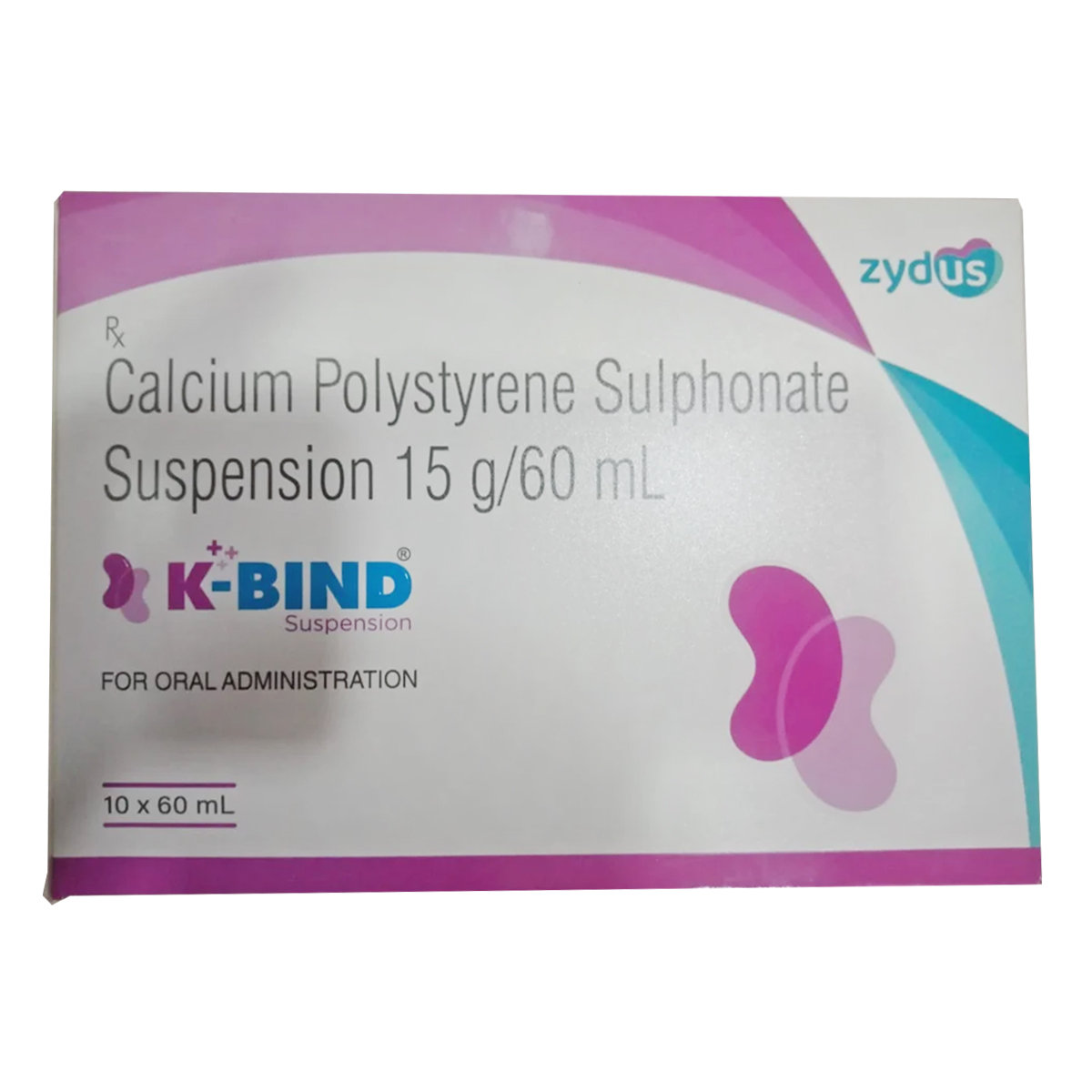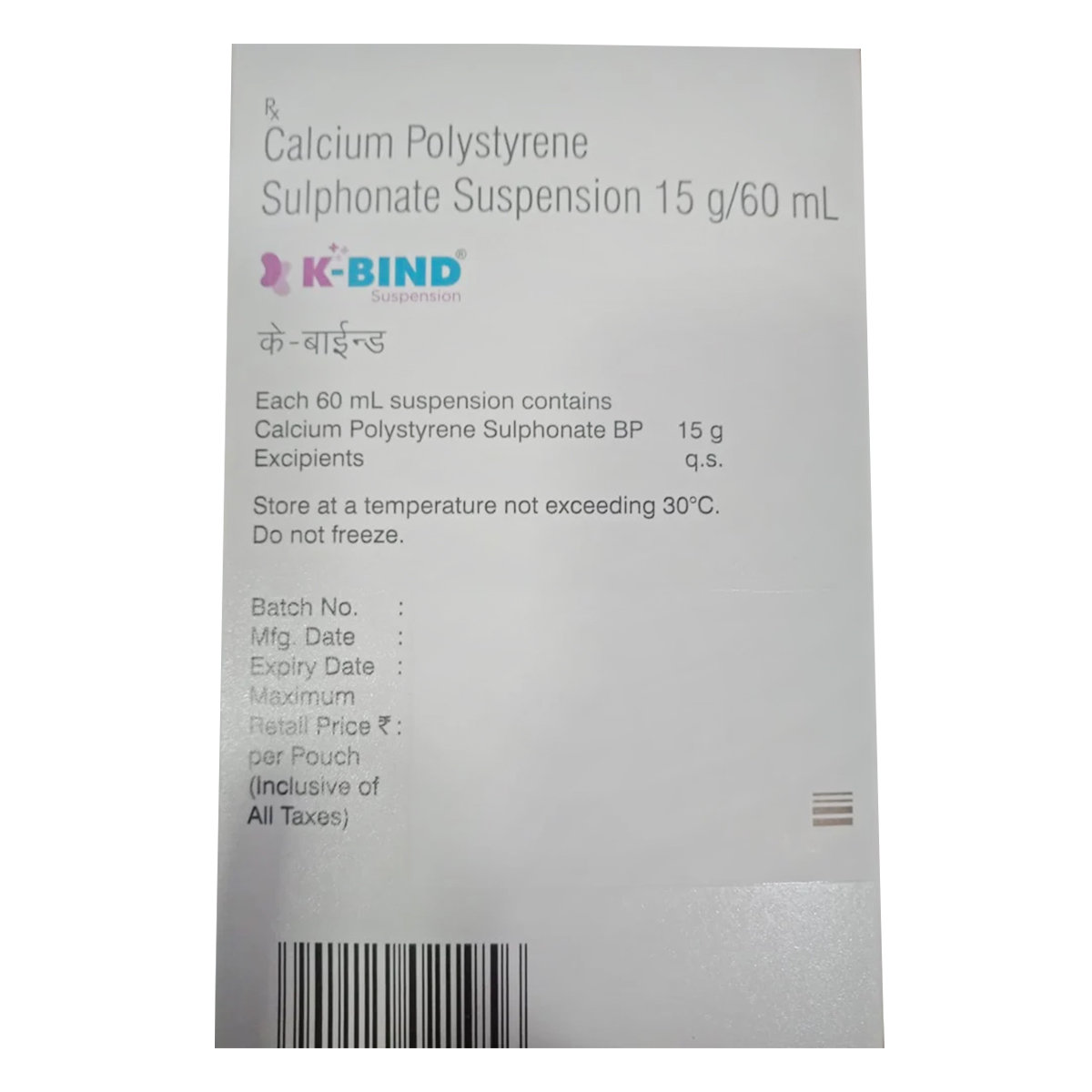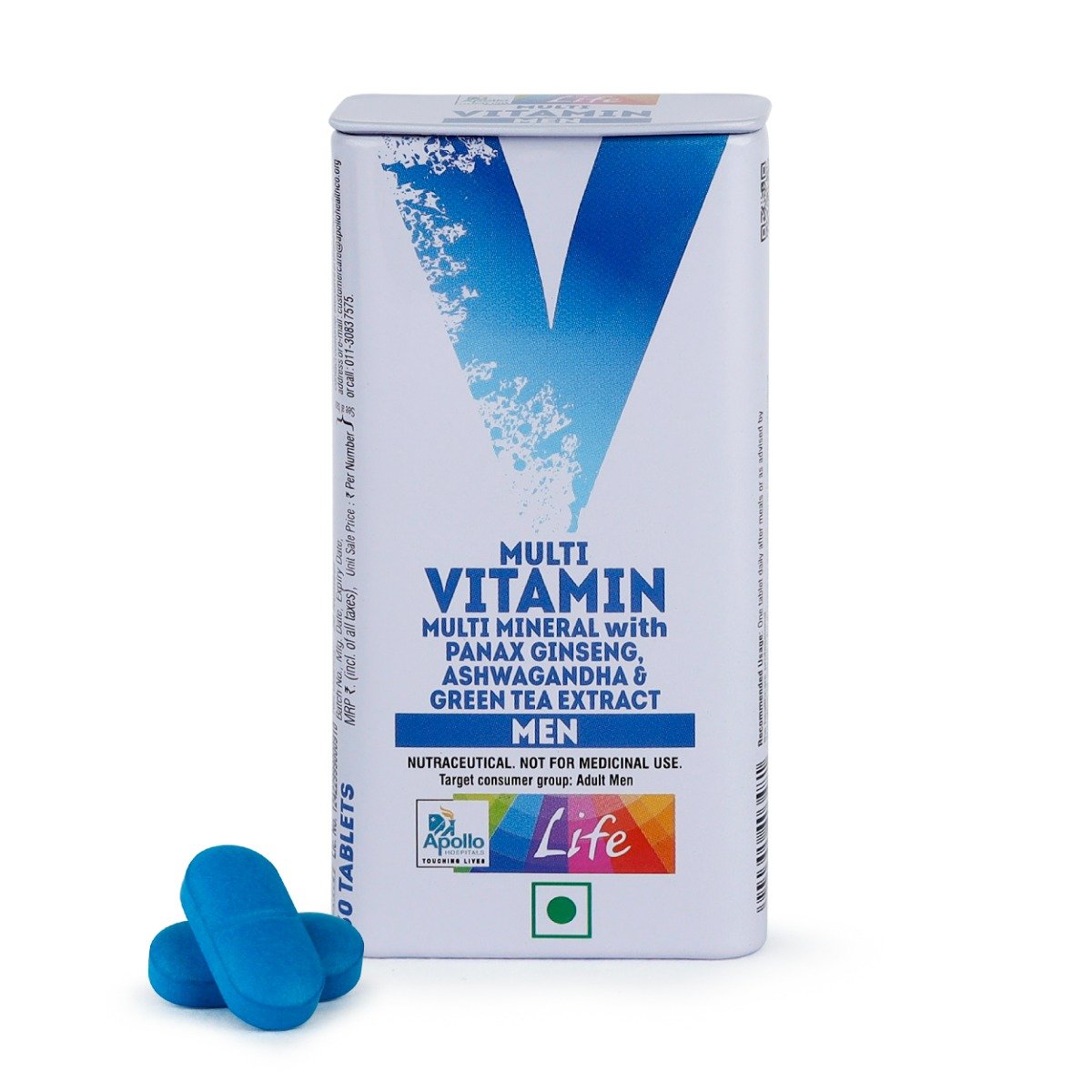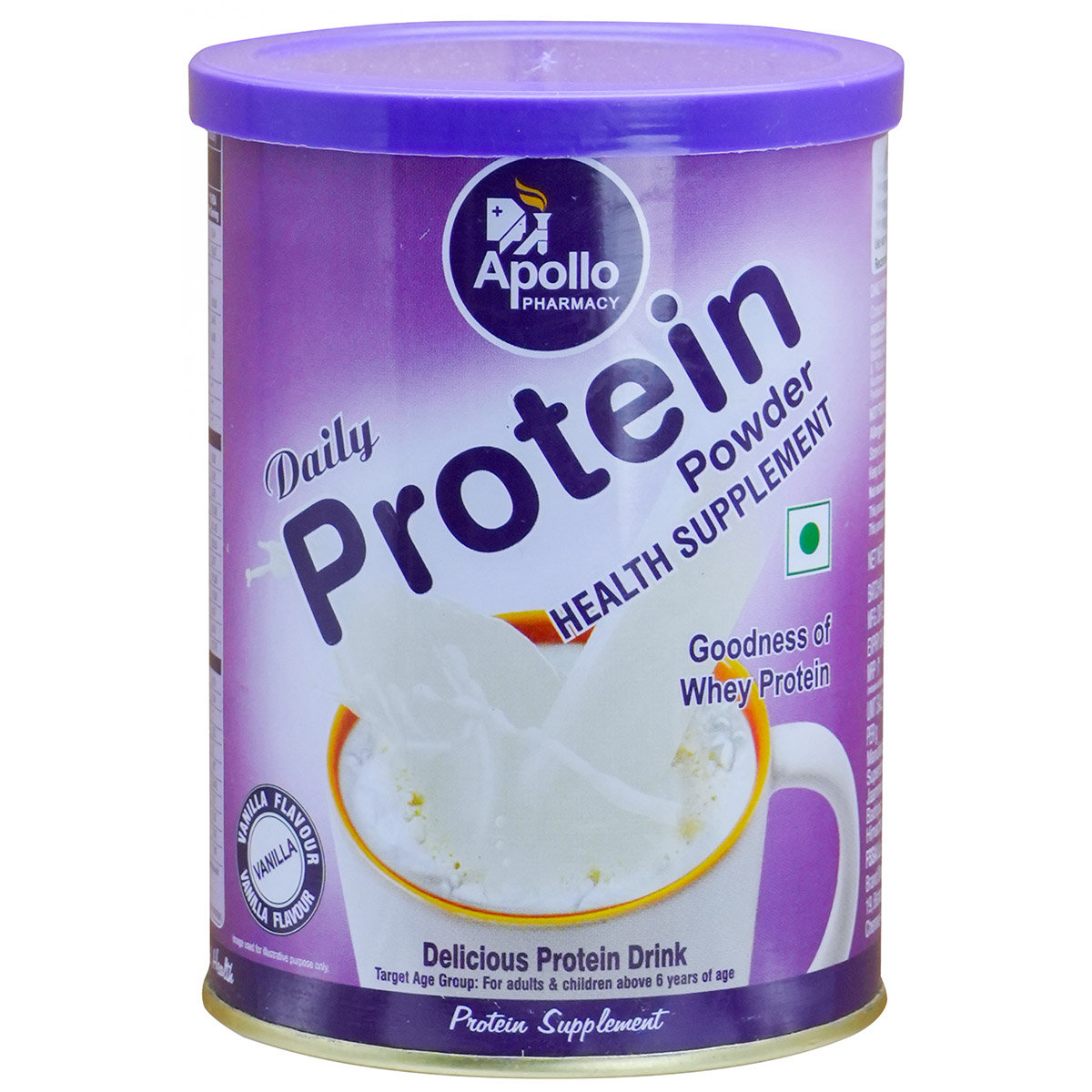K-Bind 15G Suspension 60 ml
MRP ₹168.5
(Inclusive of all Taxes)
₹25.3 Cashback (15%)
Know Your Delivery Time
Provide Delivery Location

Secure Payment

India's Most Trusted Pharmacy

Genuine Products
Composition :
Manufacturer/Marketer :
Consume Type :
Expires on or after :
Return Policy :
About K-Bind 15G Suspension
K-Bind 15G Suspension is used to treat hyperkalaemia in patients with kidney problems and on dialysis. Hyperkalaemia (high potassium) is a medical problem where you have too much potassium in your blood. Potassium aids in the proper functioning of your nerves and muscles, including your heart. Unfortunately, having too much potassium in your blood might be dangerous.
K-Bind 15G Suspension contains calcium polystyrene sulphonate, which works by eliminating excess potassium from your system in order to restore your levels to normal.
In some cases, you may experience hypokalaemia and hypocalcaemia, muscle cramps, tiredness, muscle weakness, cramps, or a change in heart rate. Most of these side effects gradually resolve over time. However, if the side effects persist, please consult your doctor.
If you are allergic to K-Bind 15G Suspension or any other medicines, please tell your doctor. If you are pregnant or breastfeeding, think you may be pregnant, or plan to have a baby, ask your doctor or pharmacist for advice before using this medicine. Children and babies must be given a suitable dose. Children and newborns may experience severe constipation if too much is given.
Uses of K-Bind 15G Suspension
K-Bind 15G Suspension is used in treatment and management of Hyperkalemia (increased potassium levels in the blood). The detailed uses of K-Bind 15G Suspension are as follows:
- Treatment and management of Hyperkalemia: K-Bind 15G Suspension is used to reduce high potassium levels in the blood (hyperkalemia), especially in patients with chronic kidney disease or those undergoing dialysis.

Have a query?
Directions for Use
- K-Bind 15G Suspension can be taken with or without food as advised by your doctor.
- Follow your doctor’s instructions on the dosage and timing of this medication.
- Pour the sachet contents into a glass of water, stir, and drink immediately.
- Do not store the mixture for later use.
Key Benefits
- K-Bind 15G Suspension belongs to a group of medicines called 'ion exchange resins.'
- It contains calcium polystyrene sulphonate, which is administered to decrease potassium levels in the body, thereby reducing the risk of hyperkalemia due to high potassium levels.
- It works by eliminating excess potassium from your system to restore your levels to normal.
How K-Bind 15G Suspension Works
Storage
- Preventing Vomiting (Before it Happens)
- Take medication exactly as prescribed by your doctor. This can help minimize side effects, including vomiting.
- Having a small meal before taking your medication can help reduce nausea and vomiting.
- Talk to your doctor about taking anti-nausea medication along with your prescribed medication.
- Managing Vomiting (If it Happens)
- Try taking ginger in the form of tea, ale, or candy to help alleviate nausea and vomiting.
- What to Do if Vomiting Persists
- Consult your doctor if vomiting continues or worsens, consult the doctor for guidance on adjusting your medication or additional treatment.
- Inform Your Doctor: Notify your doctor immediately about your diarrhoea symptoms. This allows them to adjust your medication or provide guidance on managing side effects.
- Stay Hydrated: Drink plenty of fluids to replace lost water and electrolytes. Choose water, clear broth, and electrolyte-rich drinks. Avoid carbonated or caffeinated beverages to effectively rehydrate your body.
- Follow a Bland Diet: Eat easy-to-digest foods to help firm up your stool and settle your stomach. Try incorporating bananas, rice, applesauce, toast, plain crackers, and boiled vegetables into your diet.
- Avoid Trigger Foods: Steer clear of foods that can worsen diarrhoea, such as spicy, fatty, or greasy foods, high-fibre foods, and dairy products (especially if you're lactose intolerant).
- Practice Good Hygiene: Maintain good hygiene to prevent the spread of infection. To stay healthy, wash your hands frequently, clean and disinfect surfaces regularly, and avoid exchanging personal belongings with others.
- Take Anti-Diarrheal Medications: If your doctor advises, anti-diarrheal medications such as loperamide might help manage diarrhoea symptoms. Always follow your doctor's directions.
- Keep track of your diarrhoea symptoms. If they don't get better or worse or are accompanied by severe stomach pain, blood, or dehydration signs (like extreme thirst or dark urine), seek medical help.
What if I have taken an overdose of K-Bind 15G Suspension
Drug Warnings
- If you are allergic to K-Bind 15G Suspension or any other medicines, please inform your doctor.
- If you are pregnant or breastfeeding, think you may be pregnant, or plan to have a baby, ask your doctor or pharmacist for advice before using this medicine.
- The dose is also worked out for children according to how much the child weighs.
- Children and babies must be given a suitable dose. Children and newborns may experience severe constipation if too much is given.
- While taking this medicine, your doctor may perform routine blood tests on you. This is done to determine the quantities of salts in your blood, such as potassium, sodium, calcium, and magnesium.
- Before taking K-Bind 15G Suspension, inform your doctor about your medical history and all medications you are currently taking in order to rule out any potential side effects.
Drug-Drug Interactions
Drug-Drug Interactions
Login/Sign Up
Drug-Food Interactions
Drug-Food Interactions
Login/Sign Up
Habit Forming
Therapeutic Class
Alcohol
Safe if prescribed
You are recommended not to consume alcohol along with K-Bind 15G Suspension to avoid unpleasant side effects.
Pregnancy
Consult your doctor
There is limited information available on using K-Bind 15G Suspension in patients with pregnant women. Please consult your doctor.
Breast Feeding
Consult your doctor
There is limited information available on using K-Bind 15G Suspension in breastfeeding mother's. Please consult your doctor.
Driving
Safe if prescribed
K-Bind 15G Suspension has no or negligible impact on the ability to drive or use machines.
Liver
Consult your doctor
If you have a history or evidence of any liver-related diseases, please inform the doctor before taking medicine.
Kidney
Consult your doctor
If you have a history or evidence of any kidney-related diseases, please inform the doctor before taking medicine.
Children
Safe if prescribed
K-Bind 15G Suspension can be given safely to children under the supervision of a child specialist. The dose is worked out according to how much the child weighs.
Heart
K-Bind 15G Suspension should be taken with caution in patients with heart problems. Please inform your doctor if you have any pre-existing heart problems before using K-Bind 15G Suspension.
Geriatrics
Consult your doctor
K-Bind 15G Suspension should be given to elderly patients only if prescribed by a doctor. If you have any concerns about using K-Bind 15G Suspension in geriatrics, please consult your doctor.
FAQs
K-Bind 15G Suspension is used to treat something called hyperkalaemia. It is used in patients with kidney problems and on dialysis. Hyperkalaemia (high potassium) is a medical problem where you have too much potassium in your blood.
K-Bind 15G Suspension contains calcium polystyrene sulphonate, which belongs to a group of medicines called ion exchange resins. It is used to treat a medical condition known as hyperkalaemia. This occurs when your blood has excessive potassium. It works by eliminating excess potassium from your system in order to restore your levels to normal.
The most common cause of genuinely high potassium (hyperkalemia) is a kidney problem, such as acute kidney failure. Kidney disease is chronic.
Potassium is an essential electrolyte required for various vital functions in our body. However, high potassium levels may lead to complications such as muscle cramps, pain, difficulty breathing, nausea, tiredness, chest pain, and even death.
No, it is a prescribed medication for preventing specific medical conditions such as treating hyperkalaemia. Taking this medication on your own can cause unwanted side effects.
K-Bind 15G Suspension may interact with medicines used to treat Gastroesophageal Reflux Disease (e.g. pantoprazole, esomeprazole). So, it is recommended not to take K-Bind 15G Suspension and antacids medications same time. If necessary, a time gap of 2hours in between two medicines is advisable.
Depending upon the severity of your medical condition, your doctor may prescribe K-Bind 15G Suspension to you daily for a specific duration. However, do not take it endlessly on your own without a doctor's advice.
Unfortunately, it's often difficult to know if you have hyperkalemia (high potassium level) based on symptoms alone. Many people with high potassium levels experience no noticeable symptoms. However, if you experience muscle weakness or numbness, heart palpitations or irregular heartbeat, or feeling unwell, remember that your healthcare provider is there to support you. It's essential to consult with them for guidance and reassurance.
The most reliable way to determine if you have a high potassium level is through a blood test, a trusted and accurate diagnostic tool that can provide you with the information you need for effective management.
K-Bind 15G Suspension may interact with various medications. However, it’s essential to consult with your healthcare provider or pharmacist before taking any new medications while on calcium polystyrene sulfonate. They can help you determine if your current medications could interact with the drug.
Calcium polystyrene sulfonate may cause gastrointestinal side effects, but it doesn't typically cause long-term damage to the gut. If you experience any side effects, it's essential to consult with your healthcare provider. They can assess the severity of the symptoms and recommend appropriate management strategies.
Country of origin
Manufacturer/Marketer address
Disclaimer
Author Details
We provide you with authentic, trustworthy and relevant information










